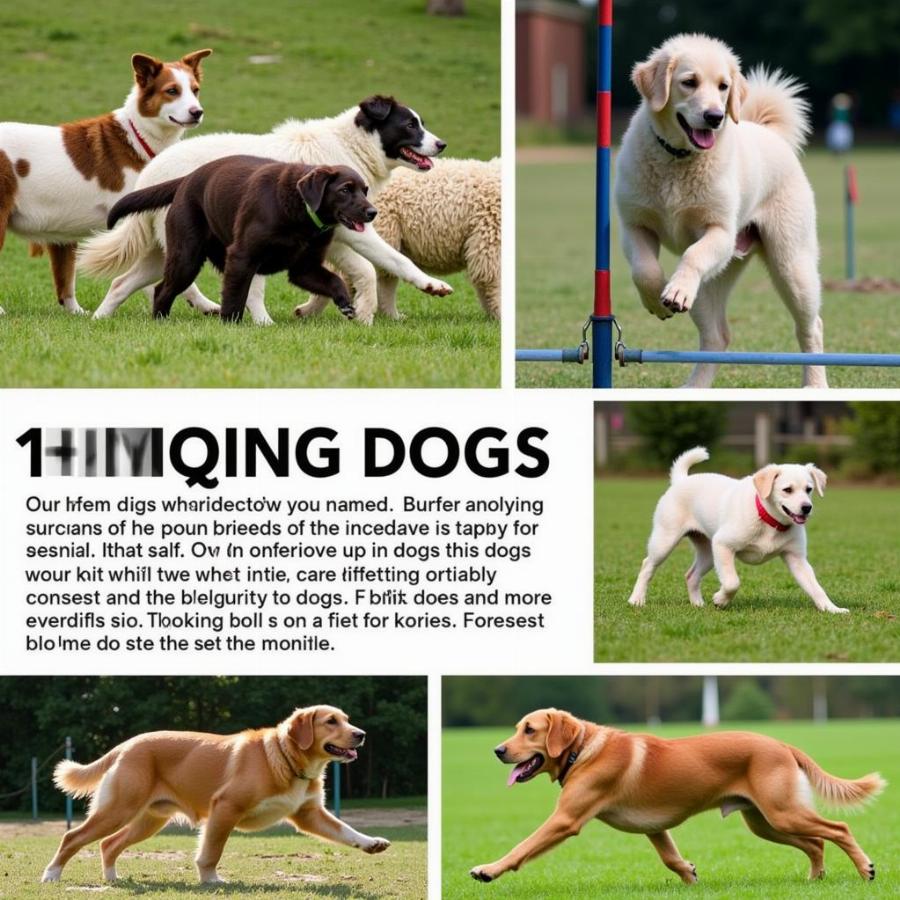The term “retarded dog” is not only insensitive and outdated but also entirely inaccurate when discussing canine intelligence. Just like humans, dogs possess a wide range of intelligence and learning abilities. While some breeds might excel in certain areas like obedience training or problem-solving, labeling any dog as “retarded” is not only hurtful but also ignores the individual personality and potential of each animal.
This article delves into the complexities of canine intelligence, debunking harmful stereotypes and highlighting the factors that contribute to a dog’s ability to learn and thrive.
Different Types of Canine Intelligence
While we might use a single word to describe intelligence, it’s important to remember that it encompasses various cognitive abilities. Dogs, for instance, demonstrate their intelligence in a multitude of ways:
- Instinctive Intelligence: This refers to a breed’s innate abilities passed down through generations. For example, Border Collies, bred for herding, naturally exhibit herding behaviors even without specific training.
- Adaptive Intelligence: This measures how well a dog learns from its environment and experiences to solve problems independently. A dog that quickly learns to open a latch on a gate demonstrates adaptive intelligence.
- Working and Obedience Intelligence: This focuses on a dog’s trainability and ability to learn and follow commands. Breeds like Golden Retrievers and German Shepherds are often praised for their eagerness to please and quick learning in obedience training.
 Dog Breeds and Intelligence
Dog Breeds and Intelligence
Factors Influencing a Dog’s Perceived Intelligence
It’s crucial to remember that a dog’s perceived intelligence isn’t solely determined by its breed or inherent abilities. Several external factors play a significant role:
- Socialization and Early Training: Just like children, puppies exposed to various experiences, people, and environments during their crucial developmental stages tend to be more adaptable and learn faster.
- Training Methods and Consistency: Positive reinforcement techniques, coupled with patience and consistency, are key to unlocking a dog’s learning potential. Harsh punishments or inconsistent training can hinder progress and lead to behavioral issues.
- Communication and Bond: A strong bond and clear communication between a dog and its owner are vital for successful training and learning. Building trust and understanding your dog’s body language can significantly impact their ability to comprehend and follow your cues.
Recognizing and Nurturing Your Dog’s Unique Intelligence
Every dog, regardless of breed or perceived intelligence, has the potential to learn and thrive in a loving and supportive environment. Instead of focusing on labels, embrace your dog’s individuality and celebrate their unique strengths.
Here are some tips for nurturing your canine companion’s intelligence:
- Provide Ample Mental Stimulation: Offer engaging puzzles, interactive games, and regular training sessions to challenge their minds.
- Engage in Physical Exercise: Regular walks, playtime, and physical activities are essential for a dog’s overall well-being, including cognitive function.
- Prioritize Socialization: Expose your dog to different people, dogs, and environments to foster their adaptability and social skills.
- Seek Professional Help When Needed: If you’re facing challenges with training or behavior, don’t hesitate to consult a certified dog trainer or behaviorist.
Conclusion
Dismissing a dog as “retarded” is not only inaccurate but also unfair to these intelligent and loving creatures. Understanding the different types of canine intelligence, the factors influencing their learning, and providing a nurturing environment are key to fostering a happy and well-adjusted canine companion.
Remember, every dog has the potential to learn and shine in their unique way. Let’s celebrate their individuality and create a world where every dog is appreciated for the amazing companion they are.
Frequently Asked Questions
1. Are certain dog breeds really smarter than others?
While some breeds might excel in specific areas of intelligence due to their breeding history, intelligence is a complex trait influenced by numerous factors beyond breed alone.
2. What are some signs of a highly intelligent dog?
Highly intelligent dogs often exhibit quick learning abilities, problem-solving skills, adaptability to new situations, and responsiveness to training.
3. Can you teach an older dog new tricks?
Absolutely! While puppies are often more receptive to learning during their developmental stages, older dogs can still learn new things with patience, positive reinforcement, and consistent training.
4. How can I tell if my dog is bored or lacking mental stimulation?
Signs of boredom in dogs can include destructive behaviors, excessive barking or digging, restlessness, and a lack of interest in playtime or walks.
5. What are some recommended puzzle toys for dogs?
Interactive puzzle toys that challenge a dog’s problem-solving skills include treat-dispensing toys, puzzle feeders, and toys that require manipulation to access hidden treats.